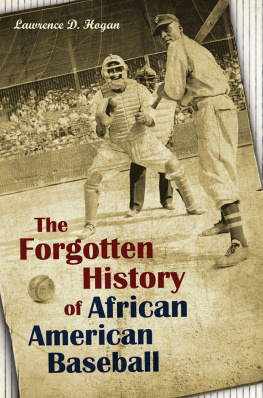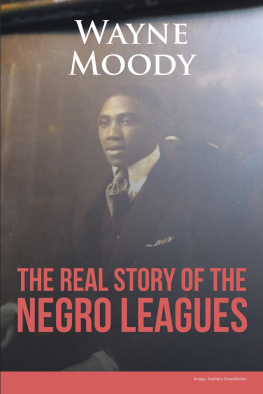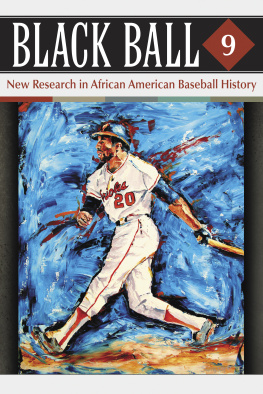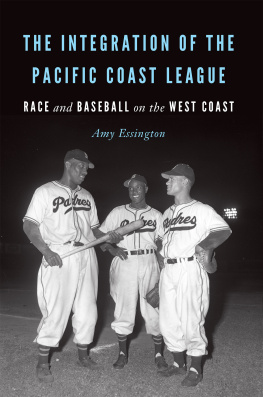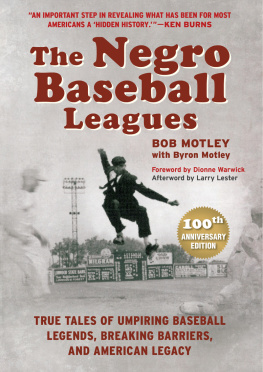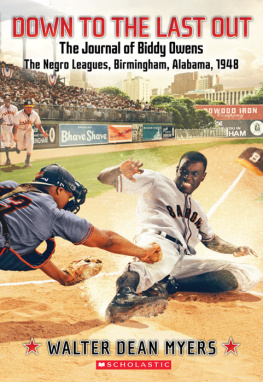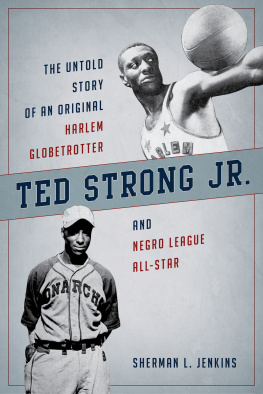In Praise of
The Forgotten History of African American Baseball
Larry Hogans The Forgotten History of African American Baseball is a compelling eye-opener of a narrative that anyone hoping to get the full story of baseball in America should read. It is a story in which truly heroic individuals overcome evilpersonified by Jim Crow and Judge Lynchand prevail. Hogan brings those heroes back to life in a most readable book.
Paul Dickson, author of Bill Veeck: Baseballs Greatest Maverick and a 2013 Chadwick Award recipient
The Forgotten History of African American Baseball is an important addition to the chronicles of baseball. It brings alive a forgotten era in our social history, by bringing alive the remarkable men whose passion and pride knew no bounds.
Dave Kaplan, Director, Yogi Berra Museum & Learning Center
Historian Larry Hogan basks in baseballs shadowed fields. He is a national treasure, and with The Forgotten History of African American Baseball he culminates decades of inspired investigation andbest of all for readersgreat tales too long untold. My cap is off to him.
John Thorn, Official Historian of Major League Baseball
Professor Hogan is a dedicated historian, passionate about casting a light on the people and the sport of baseball in eras that were marked by the segregation and injustice that prevailed across America. Yet, if you know him like I do, I see hes connected the dots, not only through research but by immersing himself in the people, places, and times to clearly represent these fascinating and almost bygone times. Hes woven the fabric of this historical quilt together from both research and relationships with those players and individuals who lived through those times.
Whether those referenced here are little known or prominent, because of them all Ive been able to build a great life through the game of baseball. I respect and honor those people and their contributions. So, thank you Dr. Larry Hogan for this latest reflection and tribute to the Negro Leagues. To me, the institution, the teams, and the people involved are national treasures.
Dave Winfield, National Baseball Hall of Fame 2001, developer of the 2008 MLB Negro League Draft and Tribute to the Negro Leagues
Larry Hogans The Forgotten History of African American Baseball stands firmly on the formidable shoulders of earlier historical studies on the life and times of modern black Americans under pressure, those who created a veritable world within a world. Their now nearly vanished world of baseball was at once a metaphor for talent and achievement, rituals, and black identity during the Jim Crow era. It was also a world that far too many Americans know little of. Hogan sheds a brilliant light on what is now known about black baseball, now ennobled as an enduring contribution to American culture, memory, and the national pastime.
Clement Alexander Price, Board of Governors Distinguished Service Professor of History, Rutgers University, Newark Campus
The Forgotten History of African American Baseball
LAWRENCE D. HOGAN
Copyright 2014 by Lawrence D. Hogan
All rights reserved. No part of this publication may be reproduced, stored in a retrieval system, or transmitted, in any form or by any means, electronic, mechanical, photocopying, recording, or otherwise, except for the inclusion of brief quotations in a review, without prior permission in writing from the publisher.
Library of Congress Cataloging-in-Publication Data
Hogan, Lawrence D., 1944
The forgotten history of African American baseball / Lawrence D. Hogan.
pages cm
Includes index.
ISBN 978-0-313-37984-0 (hardback) ISBN 978-0-313-37985-7 (ebook)
1. Negro leaguesHistory. 2. African American baseball playersHistory. 3. BaseballUnited StatesHistory. I. Title.
GV875.N35H64 2014
796.357dc23 2013034015
ISBN: 978-0-313-37984-0
EISBN: 978-0-313-37985-7
18 17 16 15 14 1 2 3 4 5
This book is also available on the World Wide Web as an eBook.
Visit www.abc-clio.com for details.
Praeger
An Imprint of ABC-CLIO, LLC
ABC-CLIO, LLC
130 Cremona Drive, P.O. Box 1911
Santa Barbara, California 93116-1911
This book is printed on acid-free paper 
Manufactured in the United States of America
The more I met Alexander Crummell, the more I felt how much that world was losing which knew so little of him. In another age he might have sat among the elders of the land in purple bordered toga; in another country mothers might have sung him to the cradles.
He did his workhe did it nobly and well; and yet I sorrow that here he worked alone, with so little human sympathy. His name today, in this broad land, means little, and comes to fifty million ears laden with no incense of memory nor emulation. And herein lies the tragedy of the age; not that men are poor, all men know something of poverty; not that men are wicked, who is good? Not that men are ignorant, what is Truth? Nay, but that men know so little of men.
W. E. B. Du Bois, Of Alexander Crummell From The Souls of Black Folk , 1903
The legacy left by the enslaved ancestors of blues-oriented contemporary U.S. Negroes includes a disposition to confront the most unpromising circumstances and make the most of what there is to go on, regardless of the oddsand not without finding delight in the process or forgetting mortality at the height of ecstasy.
Albert Murray From Stomping the Blues
To the extraordinary men and women of the black press for the legacy of grace and dignity you have left us in your record of great deeds and hard struggles.
To the extraordinary men and women of black baseball for the legacy of grace and dignity you have left us in your record of great deeds and hard struggles.
Contents
Inspiration for this book comes from those who have made me who I am, and for whom I owe a debt of gratitude and love that is incalculablefamily and friends too numerous to acknowledge individually, except for those who count the most. Sally, Rebecca, Matthew, Elizabeth, our grand grands, mom and dad, Helen, Mary Elizabeth, Dan, and mom and dad again in Kate and Bob.
The writing of this book owes a considerable debt of gratitude to a team of authors who I worked with on Shades of Glory. As I was educated by them, and shaped and edited with them their contribution to that work, and researched into the areas about which they wrote, I found myself time and again connected in enriching and novel ways to the character and characters of the history of black baseball. And their own work, outside the confines of Shades of Glory, was and remains today, as they advance that work, a considerable part of the inspiration for what I am able to do here and elsewhere with this history of black baseball. A special bow in the direction of James Overmyer, Michael Lomax, Neil Lanctot, Rob Ruck, the late Robert Peterson, Adrian Burgos, Leslie Heaphy, and codirectors for the Baseball Hall of Fames Out of the Shadows project Dick Clark and Larry Lester. So often through these pages, I find myself writing about people, places, and events that their own work has illuminated and added a depth of substance to that goes well beyond where I take this story of the extraordinary men and women of black baseball. Any mistakes here are of course my own responsibility. Corrections for those mistakes will, I suspect, often be found in the pages of these scholars own works penned by our team of Shades of Glory friends and colleagues.

